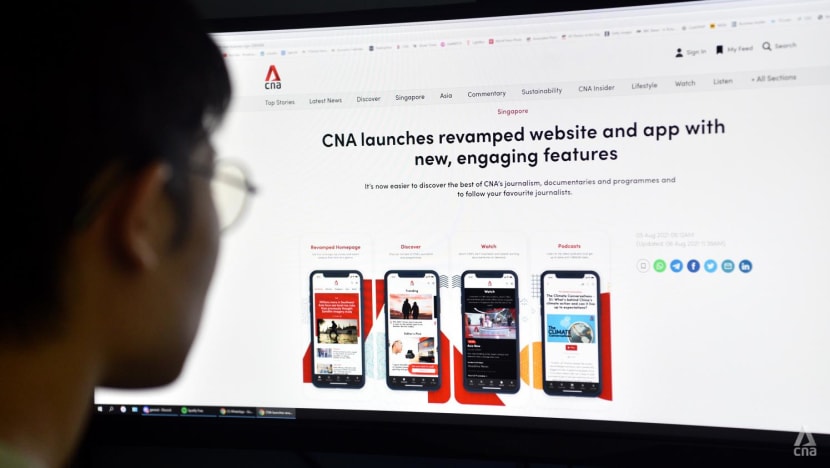CNA is Singapore's most trusted news brand for 5th year running: Reuters Institute report
The overall trust in news in Singapore rose to 45 per cent, with mainstream outlets remaining as the most trusted brands, according to the report.

Photo illustration of a person viewing an article on CNA's revamped website (Photo: Jeremy Long)
SINGAPORE: Mediacorp’s CNA remains the most trusted news brand in Singapore for the fifth consecutive year, according to a report by the Reuters Institute for Journalism at the University of Oxford in the United Kingdom published on Wednesday (Jun 14).
CNA has been ranked the most trusted news brand in the same report since 2019. This year, its brand trust score rose to 75 per cent, up 3 percentage points from 2022.
Channel 5 News which broadcasts News Tonight, a daily television news bulletin on Mediacorp’s free-to-air English language channel, and The Straits Times, which is owned by SPH Media Trust, scored 73 per cent.
Both saw their brand scores also increase 3 percentage points from last year.
Channel 8 News, which broadcasts in Mandarin on another Mediacorp channel, and Mediacorp Radio News came in at 70 per cent and 68 per cent respectively.
Mediacorp continues to have five news brands in the top 10 ranking on trust, including TODAY Online.
The overall trust in news in Singapore rose to 45 per cent from 43 per cent, with mainstream outlets remaining the most trusted brands, according to the report.
On the other hand, findings also showed that trust in news across global markets fell to 40 per cent from 42 per cent, reversing the gains made in many countries at the height of the COVID-19 pandemic.
Finland remains the country with the highest levels of overall trust with 69 per cent, while Greece has the lowest at 19 per cent following arguments about press freedom and the independence of the media, the report showed.
MOST USED ONLINE NEWS SOURCE
Alternative news site Mothership became the most used online news source for the first time, although the Reuters report noted that it “still lags” in brand trust with a score of 52 per cent.
CNA's website came in second in terms of weekly use, followed by The Straits Times online.
Mothership has a weekly online reach of 48 per cent, compared with CNA's 46 per cent. In terms of usage at least 3 times a week, CNA has a reach of 32 per cent, compared with Mothership's 30 per cent.
Online and social media continue to be the most common ways of accessing news in Singapore, while both TV and print have declined significantly over the last few years.
On social media apps, the report said: “Facebook continues to face a decline (36 per cent), while YouTube (30 per cent), Instagram (19 per cent) and TikTok (12 per cent) were able to grow as platforms for news. WhatsApp remains the most used social app for news (38 per cent).”
Associate Professor Edson Tandoc Jr and Matthew Chew from the Wee Kim Wee School of Communication and Information at Nanyang Technological University, who wrote Singapore’s portion of the digital news report, noted TikTok’s growing popularity in the country and elsewhere.
“It reaches 49 per cent of 18 to 24 (year olds) every week, and 22 per cent for news according to our survey,” they said, adding though that this is not without controversy.
“Public officials have been reminded they are not permitted to install the app on official devices, and it has been added to the list of social media companies that are required to have formal processes and systems for dealing with misinformation, under the country’s Protection from Online Falsehoods and Manipulation Act (POFMA).
“This includes transparency over political advertising.”
The Singapore government announced in March that public officers are allowed to use TikTok on government-issued devices only on a "need-to basis" under existing policy, such as for communication officers.
RISE OF TIKTOK
The rise of TikTok was also noted on a global scale.
“Our data show, more clearly than ever, how this shift is strongly influenced by habits of the youngest generations, who have grown up with social media and nowadays often pay more attention to influencers or celebrities than they do to journalists, even when it comes to news,” said Reuters Institute’s senior research associate Nic Newman.
Mr Newman added that data also show that online consumers are accessing news less frequently than in the past and are also becoming less interested.
“Despite the political and economic threats facing many people, fewer than half (48 per cent) of our aggregate sample now say they are very or extremely interested in news, down from 63 per cent in 2017.”
The Reuters Institute for the Study of Journalism is a research centre at the University of Oxford that tracks media trends. The Thomson Reuters Foundation, the philanthropic arm of Thomson Reuters, funds the Reuters Institute.
















